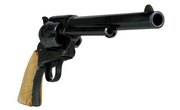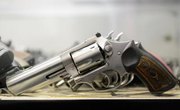Guns that are classified as 'antique' by the National Firearms Act (NFA) are guns that are not designed to use current firing and ammunition. Antique guns were generally made before 1898 and are considered collectors items because they are not designed to use as a weapon. Antique guns hold historic and monetary value to collectors based on unique characteristics and rarity. Appraisers and gun researchers can help identify antique guns.
Identify Antique Guns
Read the National Firearms Act (NFA) to understand what makes a gun an antique (see Resources below). Antique guns are a special category under the NFA and do not have the same licensing requirements as other firearms.
Make a list of gun information to help you or a professional identify the gun. Include the type, action, caliber, measurements and markings of the gun in your list. List all information known about the gun's workings, and include all lengths.
Note the markings on the guns. Record any numbers, letters or design on the guns to help research information about the guns. Communicate make and model information when known.
Take notice of the gun's construction. Write down details about wood or metal components, and identify the type of metal or wood when possible. Gun materials can help point to the origins of a gun and when it was made.
Hire an appraiser to identify your antique gun. An appraiser should be able to furnish you with identification information and a market value.
Familiarize yourself with the condition standards for antique firearms. It can be helpful for collectors to know what condition their gun is in to communicate accurately to researchers who identify antique guns and their values.
Telephone the Federal Firearms Licensing Center (FFLC) of the BATF at 1-866-662-2750 with questions about your antique guns. The FFLC can help ensure your guns are properly registered.
Warnings
- Know that only antique guns can be purchased and transferred without a license. If your antique guns have been modified, make sure they are still considered antique.
Tips
- If a gun was designed with old-fashioned workings, it is usually considered an antique whether or not it was made before 1898. Contact the Bureau of Alcohol, Tobacco & Firearms (BATF) for help determining if your gun is an antique and does not need to be registered.
Tips
- If a gun was designed with old-fashioned workings, it is usually considered an antique whether or not it was made before 1898. Contact the Bureau of Alcohol, Tobacco & Firearms (BATF) for help determining if your gun is an antique and does not need to be registered.
Warnings
- Know that only antique guns can be purchased and transferred without a license. If your antique guns have been modified, make sure they are still considered antique.
Writer Bio
This article was written by the CareerTrend team, copy edited and fact checked through a multi-point auditing system, in efforts to ensure our readers only receive the best information. To submit your questions or ideas, or to simply learn more about CareerTrend, contact us [here](http://careertrend.com/about-us).


